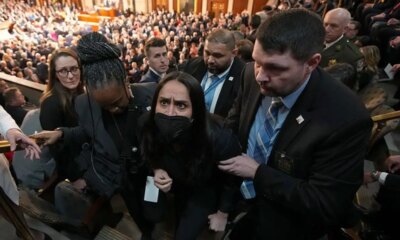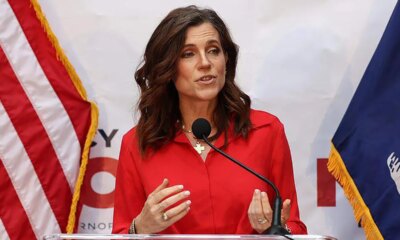New Hampshire
NH’s Ayotte vs. Craig is closest governor’s race in US.: Experts explain why it matters

DURHAM — The New Hampshire governor’s race is now the most competitive gubernatorial contest in the country, experts say, and this may be an asset to both Republican Kelly Ayotte and Democrat Joyce Craig.
Earlier this year, North Carolina and New Hampshire were seen as the top two competitive elections in the United States. But after a CNN report linked Republican North Carolina governor candidate Mark Robinson to multiple disturbing comments on a pornographic website, prompting most of his staff to resign, the formerly toss-up race has been moved to a likely Democratic victory, according to the Cook Political Report.
New Hampshire is now the only state gubernatorial race ranked a toss-up. According to recent polls from University of New Hampshire and Saint Anselm, the two candidates running for the office being vacated by Republican Gov. Chris Sununu are neck and neck.
The shake-up in the Tar Heel state may have opened up national funds that can help both Ayotte and Craig in New Hampshire. The Republican Governors Association current ad buy in North Carolina expired Tuesday, and multiple outlets reported the group has not planned any other placements.
“(Ayotte) will get help from the Republicans … because there really isn’t that much to invest in,” said UNH political science professor Dante Scala. “I mean, you look at North Carolina, maybe three, six months ago, that looked like a competitive race, but especially after last week, (it) sure doesn’t look that way anymore.”
The recent events may also free up more money from the Democratic Governors Association to help Craig in New Hampshire.
The first campaign finance filing deadline for the general election is Oct. 16.
Andrew Smith, the director of the UNH Survey Center, agreed the Republican Governors Association is likely not going to “want to bother” spending money on the North Carolina race anymore. However, Smith also wonders how independent the organization is from Republican presidential nominee Donald Trump.
“I think the Trump people are going to want to take as much money as they can from any of the campaign organizations and use it on the presidential campaign,” he said.
Money is just part of the puzzle in this tight race: Each candidate has multiple strengths and weaknesses that will contribute to how they perform in November.
How the presidential election may affect the NH governor’s race
The “Trump factor”’ is a weakness for Ayotte in New Hampshire, where polls have shown the former president losing to Vice President Kamala Harris by as much as 11%.
To win, Ayotte will to convince voters to split their tickets and run ahead of Trump by about 5-7%, according to Scala, who said that is difficult for a non-incumbent. Even Sununu, who benefited from a name that runs deep in New Hampshire tradition, barely won during his first campaign for governor in 2016, running just enough ahead of Trump to win the open seat.
Ayotte’s rocky relationship with Trump may also play a negative role within her own party. The Republican Party in New Hampshire has many different factions, from Trump Republicans to free state libertarians to more mainstream traditional Republicans like Ayotte. There may be some voters who don’t like her because she isn’t close enough with Trump, while others may not want to vote for her to show their disdain for him.
However, a plus for Ayotte is Trump isn’t likely focus on New Hampshire as the presidential race no longer appears to be close in the state, meaning Ayotte can continue to keep her distance.
“Donald Trump is an anchor on all Republicans in the state. He’s not going to help them spread their message beyond that MAGA base, and could potentially hurt them if they get closely tied to Trump in the flow of the campaign,” Smith said. “So that split-ticket bogey is really going to be the key thing for her to be able to do to try to distinguish herself from Donald Trump without alienating those Republican Trump voters.”
While the Republican base is not as strongly in support of Ayotte as the Democratic base is for Craig currently, the polls revealed Ayotte appears to be more appealing to swing or independent voters, Scala said. That’s a positive sign for collecting the split ticket voters Ayotte needs. There’s also the possibility the full Republican base will coalesce around Ayotte as the election gets closer.
“If she’s going to pull it out, she’s going to have to really kind of channel her inner Sununu,” Smith said.
Conversely, Harris at the top of the ticket is a plus for Craig, whose positive polling numbers may be in part thanks to the vice president’s popularity in New Hampshire. The Democratic Party in New Hampshire has united around Harris, and by extension, Craig. Because of that, she might even be successful with a “generic Democratic campaign,” said Scala.
The NHDP has also tended to be better at getting voters out to the polls, Smith said. They have more money and organization than the Republican Party in New Hampshire, largely because of divides in the NHGOP like the Tea Party in the 2010s and Trump now.
How name recognition can be a boon – but other times a curse
One of Ayotte’s main strengths throughout this election has been her name ID. A former U.S. senator and New Hampshire attorney general, her strong name recognition was partially responsible for her dominant primary win over former state Senate President Chuck Morse. The experience of running those two statewide campaigns is also a strength for her in this election.
But her strong name ID may also be contributing to her negative favorability ratings: -5% according to the Saint Anselm poll and -17% according to UNH.
Craig, a former Manchester mayor, on the other hand, is less well known. But this can also be a strength as she hasn’t been caught up in as many “cross-party wars” as Ayotte, said Smith. Her favorability numbers are also positive — although Smith thinks that might change as the race gets closer and negative advertising ramps up.
The battle lines: Abortion and the city of Manchester
Craig’s biggest weakness, “fair or unfair,” Smith said, is the way Manchester is perceived to have been governed under her.
“You can see this has already been played out back in November last year,” said Smith, referring to last year’s mayoral race, when Republican Jay Ruais won over Craig’s endorsed successor. “That’s a harder problem for her to overcome, because that’s a policy issue. It’s not a personal issue.”
During the primary, Craig faced attacks about Manchester’s homelessness and drug issues from both sides of the aisle.
Craig will also have to address questions on taxes, crime, and immigration, all tried and true attacks Republicans use against Democrats.
Ayotte’s weakest issue is abortion, a consistent topic used by Democrats across the country. Both sides have put in a lot of effort trying to inform voters about how the governor’s race would affect abortion policy in New Hampshire: Ayotte even put out an ad saying she would not change New Hampshire’s current 24-week abortion law.
“It is something on which her voting history is to the right of what I would say is your average New Hampshire voter,” Scala said. As a senator, Ayotte supported a 20-week abortion ban as well as the overturning of Roe v. Wade.
More: Craig would give NH education chief Frank Edelblut the boot. Ayotte backs his policies.
The question for Scala, though, is if Democrats will open another line of attack against Ayotte.
“Abortion is a problem for Ayotte, but Democrats have already spent a lot of money going after Ayotte on abortion,” Scala said. “How much more is there to get out of that issue? And I think that’s a fair question.”

New Hampshire
Former president of NH-based charity sentenced after stealing $350K
New Hampshire
Mass. man struck by car, seriously injured on I-93 in Londonderry, NH

A Massachusetts man was flown to the hospital after he was struck by a car when he stepped out of his vehicle in the breakdown lane of Interstate 93 in Londonderry, New Hampshire, on Saturday morning.
State police say 40-year-old Felix Matos Medina, of Lawrence, had stopped on the right side of I-93 south at Exit 5 just before 11 a.m. to investigate a possible mechanical issue. He was struck shortly after he stepped out of his vehicle by a Chevrolet Malibu and sustained serious injuries.
Medina was taken by medical helicopter to Lahey Hospital and Medical Center in Burlington, Mass., police said. There was no immediate update on his condition.
I-93 southbound was closed near Exit 5 for about 30 minutes to facilitate the medical helicopter’s landing. One lane remained closed for several hours to accommodate crash reconstruction and on-scene investigation.
The driver who struck Medina, identified as David Jodoin, stopped at the scene and is cooperating with investigators, according to police. No charges have been filed at this time, but all aspects of the crash remain under investigation at this time.
Anyone with information that may assist the investigation is asked to contact Trooper Evan Puopolo at 603-451-9784.
State police are also reminding all New Hampshire drivers that Sherrill’s Law requires motorists approaching a stopped vehicle displaying warning signals to slow down and give plenty of space. Drivers are also required to move out of partially or wholly blocked lanes when it’s safe to do so.
New Hampshire
Downtown Shooting | How Much Income Makes Someone ‘Rich’ | Sex Sale Gone Bad On Facebook? Nearby News NH

CONCORD, NH — Here are the Top 10 most popular stories and posts from around New Hampshire Patch sites last week.
- Concord Police Investigating The Death Of A Young Child In The City’s South End Neighborhood: Update: Dakin Street was closed to traffic for several hours during an investigation of a child found dead at a duplex on Friday morning.
- Facebook Marketplace Cleaning Services Hire Or Sex Sale Gone Bad Leads To Stabbing In Manchester: Court docs: Frank Miller of Manchester and Kendra Gokey, a homeless woman, were arrested on first-degree assault and other charges Sunday.
- Man Shot During Dispute On South State Street In Downtown Concord: Video: Breaking: A man was shot in the leg Saturday during a dispute; cops have South State Street from Thompson to Concord closed to traffic.
- Fast Food Chain Closing Locations | Queen City Killing | Meth Distributor Pleads Guilty | More: Nearby News: Also: Best sandwich shop in NH; untimely death; crashes; knife attack indictments; firefighter injured in explosion released from hospital.
- After The Snow Sunday And Monday, More Is Coming To New Hampshire, Forecasters Say: After the storm that is expected to bring 8 to 12 inches of snow to the state, more snowstorm fronts are expected to arrive this week.
- 6 To 15 Inches Of Snow Heading To The Granite State Sunday Night; Wind Gusts Up To 45 mph: Forecasters: Heavy, blinding snow is expected in central and southern New Hampshire, as well as the Seacoast, from Sunday night to Monday morning.
- National Fast Food Chain To Close Hundreds Of Restaurants; New Hampshire Locations May Be Impacted: The chain that closed hundreds of locations in 2024 expects to shutter approximately 360 nationwide during the first half of 2026.
- Police Arrest Man On Felony Charges After South State Street Shooting In Downtown Concord: Follow-Up: David Anziani faces first-degree and second-degree assault, reckless conduct, and felonious firearm charges after a shooting on Saturday.
- Hollis Teen Faces Assault Charge, Accused Of An ‘Unprovoked’ Attack In Downtown Nashua In November: Connor Cook was arrested in late December after being accused of punching another man in the face on Main Street and then fleeing the scene.
- How Much Income Is Needed To Be Considered ‘Rich’ In New Hampshire?: A new analysis details the annual household income required to be considered among the top 10 percent of earners in the Granite State.
Here are some other posts readers may have missed:
Child Death Investigation | Queen City Tax Cap Fight | Fun Things To Do This Weekend | More: PM Patch NH
-

 World4 days ago
World4 days agoExclusive: DeepSeek withholds latest AI model from US chipmakers including Nvidia, sources say
-

 Massachusetts4 days ago
Massachusetts4 days agoMother and daughter injured in Taunton house explosion
-

 Montana1 week ago
Montana1 week ago2026 MHSA Montana Wrestling State Championship Brackets And Results – FloWrestling
-

 Denver, CO4 days ago
Denver, CO4 days ago10 acres charred, 5 injured in Thornton grass fire, evacuation orders lifted
-

 Louisiana7 days ago
Louisiana7 days agoWildfire near Gum Swamp Road in Livingston Parish now under control; more than 200 acres burned
-

 Technology1 week ago
Technology1 week agoYouTube TV billing scam emails are hitting inboxes
-

 Technology1 week ago
Technology1 week agoStellantis is in a crisis of its own making
-

 Politics1 week ago
Politics1 week agoOpenAI didn’t contact police despite employees flagging mass shooter’s concerning chatbot interactions: REPORT






















